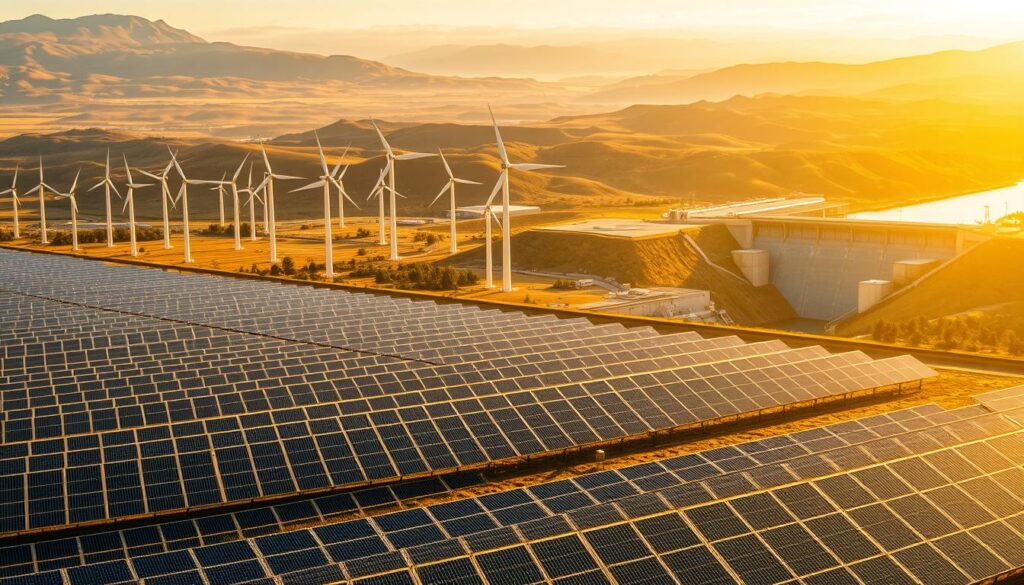In recent years, there’s been a noticeable shift in how people think about their finances. More individuals are seeking ways to align their money with their values. This has led to a rise in demand for sustainable financial solutions that benefit both your wallet and the planet.
Traditional institutions have long been tied to industries like fossil fuels, with reports showing $673 billion in financing for such projects. However, a new wave of banks is emerging, focusing on renewable energy and other eco-friendly initiatives. These institutions offer high-interest green accounts, allowing you to earn while supporting positive change.
By choosing these accounts, you can ensure your funds are used to combat climate change and promote clean energy. This article will explore some of the leading institutions making a difference in 2025, helping you make informed decisions about where to invest your money.
Key Takeaways
- Growing interest in financial solutions that support environmental goals.
- High-interest green accounts combine financial returns with positive impact.
- Traditional banks have funded fossil fuel projects extensively.
- Sustainable institutions focus on renewable energy and eco-friendly initiatives.
- Your money can help combat climate change when invested wisely.
Why Ethical Banking Matters in 2025
The financial choices you make today can shape the world of tomorrow. Traditional banks often prioritize profits over the planet, investing heavily in industries like fossil fuels. Since the Paris Agreement, banks have funneled $4.6 trillion into these projects, contributing to climate change and environmental degradation.
These investments have a direct impact on our planet. From rising sea levels to extreme weather events, the consequences are felt by communities worldwide. By choosing where to deposit your money, you can help shift this narrative. Your deposits can fund renewable energy projects instead of harmful industries.
Here’s how your financial decisions can drive change:
- Traditional banks like JPMorgan Chase and Wells Fargo are among the top funders of fossil fuels.
- Shifting your money to sustainable institutions can reduce carbon emissions significantly.
- Your deposits can support initiatives that protect the environment and promote clean energy.
For example, Barclays has pledged to achieve net-zero emissions by 2050, showing how financial institutions can lead the way. By aligning your money with your values, you can be part of a global movement toward a healthier planet.
Ethical Banking 2025: Top 10 Banks Paying You to Save the Planet
More people are choosing financial institutions that align with their values. These organizations focus on supporting renewable energy, reducing carbon emissions, and funding eco-friendly projects. Here’s a closer look at some of the leading institutions driving positive change.

Beneficial State Bank
This bank is a certified B Corp, aligning with the UN Sustainable Development Goals. Over 75% of its loans go to mission-aligned projects, including solar partnerships. It also publishes detailed carbon reports to ensure transparency.
Aspiration
Aspiration stands out with its unique carbon credit projects. For every $1,000 deposited, it saves the equivalent of 6,000 car miles of carbon emissions. Additionally, it donates 10% of its profits to charitable causes.
Climate First Bank
This institution is a member of the Race to Zero campaign and 1% For The Planet. It offers 90% project financing for solar and electric vehicle initiatives, making it a leader in clean energy funding.
Ando Money
Ando Money ensures 100% of deposits are allocated to climate solutions. It also offers tree-planting insurance, further supporting environmental restoration efforts.
National Cooperative Bank
With $475 million invested in low-income communities, this bank focuses on creating equitable opportunities while supporting sustainable development.
Capital One
Capital One is committed to LEED certification and supports circular fashion initiatives. Its efforts highlight the importance of sustainable practices in the financial sector.
Amalgamated Bank
This bank has provided $839 million in climate loans and has zero investments in fossil fuels. Its focus on clean energy projects sets a strong example for others.
Sunrise Banks
Sunrise Banks donates 2% of its net profits to charitable causes and offers employees 40 hours of volunteer PTO annually. Its commitment to community engagement is noteworthy.
Clean Energy Credit Union
This institution has funded over 10,000 clean energy loans, making it a key player in promoting renewable energy solutions.
Barclays (UK)
Barclays offers green mortgages and has pledged to achieve net-zero emissions by 2050. Its initiatives demonstrate a strong commitment to combating climate change.
| Bank | Key Initiatives |
|---|---|
| Beneficial State Bank | B Corp, 75% mission-aligned loans, carbon reports |
| Aspiration | Carbon credits, 10% profit donations |
| Climate First Bank | Race to Zero, 90% solar/EV financing |
| Ando Money | 100% climate solutions, tree-planting insurance |
| National Cooperative Bank | $475M in low-income communities |
| Capital One | LEED certification, circular fashion support |
| Amalgamated Bank | $839M climate loans, zero fossil fuel investments |
| Sunrise Banks | 2% net profit donations, 40hr volunteer PTO |
| Clean Energy Credit Union | 10K+ clean energy loans |
| Barclays (UK) | Green mortgages, net-zero 2050 pledge |
How Sustainable Banks Are Fighting Climate Change
Sustainable banks are stepping up to combat climate change in meaningful ways. By redirecting funds from fossil fuels to renewable energy, these institutions are making a tangible impact. Your deposits can support projects that reduce carbon emissions and promote clean energy solutions.
One standout example is Amalgamated Bank, which has provided $839 million in climate protection loans. These funds support renewable energy projects, helping to reduce reliance on harmful fossil fuels. Similarly, Triodos Bank avoids 1,000 kilotons of CO2 annually through its sustainable initiatives.
Here’s how these banks are driving change:
- Reinvesting deposits into renewable energy instead of fossil fuels.
- Offering carbon offset programs, like Aspiration’s reforestation projects.
- Partnering with environmental nonprofits, such as 1% For The Planet.
Climate First Bank is another leader in this space. It provides 90% financing for solar and electric vehicle initiatives, making clean energy more accessible. Barclays is also making strides by investing in climate tech startups, showcasing the power of investment in innovation.
«Sustainable finance is not just a trend—it’s a necessity for a healthier planet.»
By choosing these institutions, you can ensure your money supports initiatives that protect the climate. Together, we can create a future where finance drives positive environmental change.
| Bank | Key Climate Initiatives |
|---|---|
| Amalgamated Bank | $839M in climate protection loans |
| Triodos Bank | Avoids 1K kilotons of CO2 annually |
| Climate First Bank | 90% financing for solar/EV projects |
| Barclays | Investments in climate tech startups |
Certifications to Look for in Ethical Banks
Choosing the right financial institution involves more than just interest rates—it’s about aligning your money with your values. Certifications can help you identify organizations committed to positive impact. These credentials ensure accountability and transparency in areas like fossil fuel divestment and community support.
B Corporation
B Corp certification is a gold standard for balancing profit and purpose. For example, Beneficial State Bank ranks in the top 5% of B Corps globally. This bank ensures over 75% of its loans go to mission-aligned projects, such as renewable energy partnerships. Its detailed carbon reports further highlight its commitment to transparency.
Global Alliance for Banking on Values (GABV)
The GABV includes over 70 financial institutions dedicated to transparency and sustainability. Sunrise Banks, a member of this alliance, publishes annual impact reports to showcase its contributions. These reports detail how the bank supports renewable energy and underserved communities.
Community Development Financial Institution (CDFI)
CDFI certification focuses on supporting underserved areas. National Cooperative Bank, for instance, has provided $2.9 million in grants to nonprofits. This financial institution prioritizes equitable opportunities and sustainable development, making it a trusted choice for socially conscious investors.
| Certification | Key Features |
|---|---|
| B Corporation | Top 5% ranking, 75% mission-aligned loans, carbon reports |
| GABV | 70+ members, annual impact reports, transparency |
| CDFI | $2.9M nonprofit grants, focus on underserved communities |
The Role of Fossil Fuel Divestment in Green Banking
Divesting from fossil fuels is a key strategy for green banking. Traditional financial institutions have long supported industries like coal and oil, contributing to environmental harm. In 2023, fossil fuel companies made $280 billion in profits, fueling further extraction and climate damage.
This creates a vicious cycle. Profits from fossil fuels are reinvested into more extraction, worsening the environment. However, a new wave of banks is breaking this pattern. For example, Amalgamated Bank maintains a 0% fossil fuel portfolio, ensuring your money supports clean energy instead.
Here’s how these institutions are leading the way:
- Ando Money ensures 100% of its investment goes to fossil-free projects, setting a high standard for others.
- Barclays has excluded coal and oil sands financing from its portfolio, showing a commitment to sustainable practices.
- These efforts redirect funds from harmful fuel sources to renewable energy, creating a positive impact.
«Divestment is not just a financial strategy—it’s a moral imperative for a healthier planet.»
By choosing banks that divest from fossil fuels, you can help break the cycle of environmental harm. Your deposits can support renewable energy projects, driving meaningful change for the environment.
| Bank | Divestment Initiatives |
|---|---|
| Amalgamated Bank | 0% fossil fuel portfolio |
| Ando Money | 100% fossil-free investing |
| Barclays | Exclusion of coal/oil sands financing |
How Your Deposits Drive Renewable Energy Projects
Your deposits can play a powerful role in shaping a cleaner future. When you choose financial institutions focused on sustainability, your money directly funds renewable energy initiatives. These projects include solar farms, electric vehicle infrastructure, and green construction loans.

For example, the Clean Energy Credit Union has funded over 700,000 tons of CO2 offsets. This means your deposits help reduce harmful emissions and promote cleaner air for communities nationwide. Similarly, the National Cooperative Bank financed a 132MW solar power project, showcasing how your investment can scale clean energy solutions.
Here’s how your deposits make a difference:
- Solar energy projects, like those funded by Climate First Bank, receive up to 90% financing from customer deposits.
- Electric vehicle initiatives benefit from green loans, making sustainable transportation more accessible.
- Aspiration uses satellite and AI technology to track carbon emissions, ensuring your money supports measurable environmental progress.
Globally, institutions like Triodos Bank have provided €9.4 billion in sustainable loans. These funds support a wide range of eco-friendly projects, from wind farms to energy-efficient buildings. By choosing these banks, you’re not just saving money—you’re investing in a healthier planet.
Comparing High-Interest Green Accounts
High-interest green accounts are gaining popularity for their dual benefits. They allow you to grow your savings while supporting eco-friendly initiatives. When choosing a bank, it’s essential to compare interest rates, fees, and unique perks to find the best fit for your needs.
Aspiration’s Plus Account offers a competitive 3.00% APY, making it a standout option for those looking to maximize returns. On the other hand, Ando Money provides no-fee checking and savings accounts, ensuring accessibility for all users. Both institutions prioritize sustainability, but their services cater to different financial goals.
Here’s a quick comparison of key features:
- Aspiration: Tree-planting initiatives and carbon offset programs.
- Ando Money: 100% fossil-free investing and tree-planting insurance.
- Amalgamated Bank: Zelle integration for seamless transactions.
Accessibility is another factor to consider. While many banks operate online, some offer in-person services for those who prefer face-to-face interactions. Barclays, for example, rewards customers with energy-efficient home incentives, adding extra value to their products.
| Bank | Key Features |
|---|---|
| Aspiration | 3.00% APY, tree-planting, carbon offsets |
| Ando Money | No-fee accounts, tree-planting insurance |
| Amalgamated Bank | Zelle integration, zero fossil fuel investments |
| Barclays | Energy-efficient home rewards |
By comparing these options, you can find a savings account that aligns with your financial and environmental goals. Whether you prioritize high returns or unique perks, there’s a green account out there for you.
The Future of Ethical Banking: Trends to Watch
The landscape of finance is evolving rapidly, with a growing focus on sustainability. As financial institutions adapt to new demands, several trends are shaping the future of ethical banking. These trends highlight how your money can drive positive change while supporting a healthier planet.

One major trend is the rise of carbon credit trading platforms. These platforms allow financial institutions to offset their carbon footprint by investing in eco-friendly projects. For example, Aspiration uses AI-driven tools to measure the impact of its initiatives, ensuring transparency and accountability.
Another key development is the increasing demand for green mortgages and EV loans. These products make it easier for individuals to invest in sustainable homes and vehicles. Barclays, for instance, has set a 2050 net-zero goal, while Bank Australia aims for 2035. These targets reflect a broader commitment to reducing reliance on fossil fuels.
Regulatory shifts are also playing a crucial role. Governments worldwide are introducing policies that favor climate disclosures. This encourages financial institutions to be more transparent about their environmental impact. Such measures help consumers make informed decisions about where to invest their money.
Here’s a quick look at some of the key trends:
- Growth in carbon credit trading platforms.
- AI-driven tools for measuring environmental impact.
- Rising demand for green mortgages and EV loans.
- Regulatory changes promoting climate disclosures.
By staying informed about these trends, you can choose financial institutions that align with your values. Your investment can support energy projects that benefit both your wallet and the planet.
FAQ
What makes a bank ethical in 2025?
Ethical banks focus on supporting environmental and social causes. They avoid funding fossil fuels, invest in renewable energy, and offer products like high-interest green accounts that benefit both you and the planet.
How do sustainable banks fight climate change?
These banks fund renewable energy projects, reduce carbon emissions, and promote eco-friendly initiatives. Your deposits help drive these efforts, making a positive environmental impact.
What certifications should I look for in an ethical bank?
Look for certifications like B Corporation, Global Alliance for Banking on Values (GABV), and Community Development Financial Institution (CDFI). These ensure the bank meets high ethical and environmental standards.
Why is fossil fuel divestment important in green banking?
Divesting from fossil fuels reduces funding for harmful industries. Ethical banks redirect investments toward clean energy and sustainable projects, helping combat climate change.
How do my deposits support renewable energy projects?
When you deposit money in an ethical bank, it uses those funds to finance solar, wind, and other renewable energy initiatives. Your savings directly contribute to a greener future.
Conclusion
Making a difference with your money starts with choosing the right financial partner. Sustainable institutions combine profit with positive impact, ensuring your funds support initiatives like renewable energy and community development. By switching to these accounts, you can help reduce reliance on fossil fuel industries and promote cleaner alternatives.
Collective action is key. When more people shift their deposits, it sends a powerful message to traditional banks. Together, we can redirect funds away from harmful practices and toward solutions that combat climate change.
Sunrise Banks, recognized as one of the most socially responsible institutions, exemplifies this commitment. Their efforts show how your choices can drive meaningful change. Start today—your money can shape a better future.



